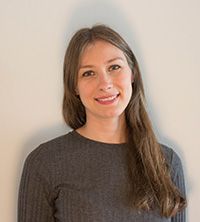– What are the most important aspects of your job?
– The Norwegian Language Bank at the National Library is developing language resources that people can use for research purposes and to develop language technology. Our task is thus to facilitate research and product development.
I am primarily working on a voice assistant project in the Norwegian Language Bank. We want to publish a database of voice recordings of the kinds of questions and commands people say to a voice assistant on mobile devices, such as Siri or Google Assistant. My tasks in this project have been to research what mobile functions this kind of assistant can perform, formulate written sentences, organise them on the basis of semantic analysis, and record the sentences using a range of different dialect users so that the speech data represent multiple dialect areas in Norway. The data will be made available both as text resources with the written sentences and as speech resources with the recordings. People can then use these resources freely to create, for example, a voice assistant or chatbot.
In recent months I have also been working as a research adviser at the National Library. I am involved in an application for funding that the National Library is going to submit to the Research Council of Norway in November. Here, my most important tasks are to analyse the Research Council of Norway’s call for applications, ensure that the application meets all the necessary requirements, and understand the Research Council’s priorities and long-term strategies.
I have previously also participated in a transcription project in the Norwegian Language Bank in which recordings from parliamentary debates in the Storting are transcribed. These will be made public as a resource comprising voice recordings and matching text that people can use to develop technology that automatically recognises and transcribes speech.”
– What do you like best about your job?
– What I like most about my job is that I get to use my linguistic knowledge in the projects I work on at the Language Bank. My knowledge of Norwegian semantics, syntax, phonology, etc. is absolutely essential to be able to do my work. I like that my voice counts, and that I can help shape the project.
Although my work as a research adviser is not directly relevant to my education in linguistics, it is very exciting to work on a major application in an important institution like the National Library. I have learned a lot about the application process, how the partners in an application work to shape the project, and how a large project funded by the Research Council of Norway comes about.
– Out of everything you learnt at the Faculty of Humanities, what has been most useful to you in this job?
– My education in linguistics has been an absolute necessity to be able to carry out my work at the Norwegian Language Bank. I have had to use my knowledge of the semantics, syntax, morphology, phonetics and phonology of the Norwegian language, as well as knowledge about dialectical variations and the relationship between Bokmål and Nynorsk.
In connection with my master’s thesis, I recorded informants and transcribed their speech. This experience has been useful in connection with the transcription and recording work in my current job.
Even in my work as a research adviser, I am using skills I learned from my studies. I am able to think consciously about how best to formulate a text. The application to the Research Council of Norway is going to be written in English, and since I have a bachelor’s degree in English language, I am in a good position to ensure that the English text is well formulated.
– What is the best advice you can give new students who are wondering about the job opportunities available to them after graduation?
– The language technology industry will continue to grow steadily in the years to come. A new job market has opened up where a variety of different companies need people who are both trained linguists and native speakers of the language for which language technology is being developed. These kinds of projects can be a good place to start to get a relevant job after graduation, although these are often short-term projects with overseas companies that do not offer as good terms and conditions of employment as we are accustomed to in Norway.
Marie Iversdatter Røsok
Dicipline:
Linguistics
Grade:
Master's
Graduation HF:
2016
Position:
Adviser at the Norwegian Language Bank
Employer:
The National Library (nb.no)
